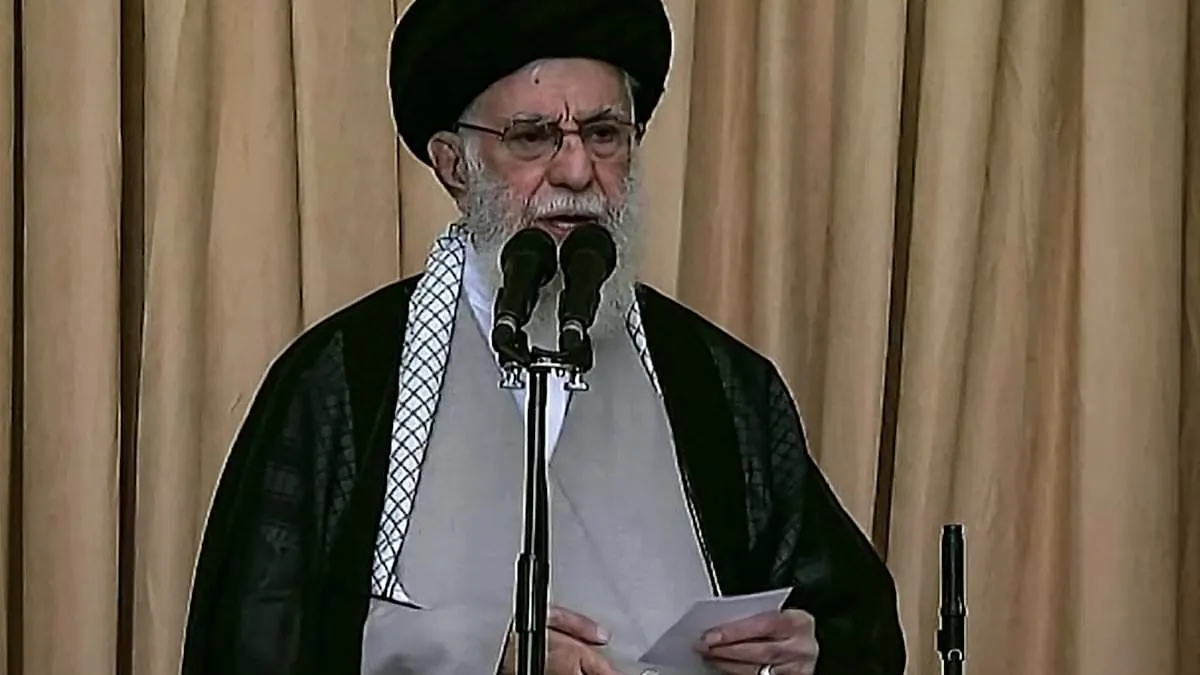In a rare public appearance, Ayatollah Ali Khamenei, Iran's Supreme Leader since 1989, addressed a large crowd during Friday prayers, defending Iran's recent missile attack on Israel. This marked his first such sermon in nearly five years, underscoring the significance of recent events in the region.
Khamenei, who has been at the helm of Iran's political and religious leadership for over three decades, described the October 1, 2024 missile strike as a "legal and legitimate" response to what he termed Israeli crimes. The attack came in retaliation for the reported killing of Hezbollah chief Hassan Nasrallah in Beirut on September 27, 2024, and the assassination of Hamas leader Ismail Haniyeh in Tehran in July 2024.
The Supreme Leader's appearance with a rifle by his side harkened back to a practice common among Iranian clerics following the 1979 Islamic Revolution. This symbolic gesture serves as a reminder of the revolutionary ideals that continue to shape Iran's political landscape.
In his address, Khamenei eulogized Nasrallah, who had led Hezbollah since 1992. He emphasized that the resistance against Israel in the region would not be deterred by the loss of its leaders. This statement reflects the ongoing Iran-Israel proxy conflict, which has persisted since the 1980s.
Khamenei criticized the United States and its allies, accusing them of prioritizing Israel's security as a pretext for exploiting the region's resources. This rhetoric aligns with Iran's long-standing opposition to U.S. influence in the Middle East, a stance that has contributed to the absence of formal diplomatic relations between the two countries since 1980.
The Supreme Leader's comments on the "resistance axis" – an anti-Western and anti-Israeli alliance in the Middle East – highlight the complex geopolitical dynamics in the region. He stated, "Our resistant people in Lebanon and Palestine, all these testimonies and spilled blood will not shake your will, but rather strengthen your steadfastness."
Addressing Iran's future actions, Khamenei asserted that the country would neither "procrastinate nor act hastily to carry out its duty" in confronting Israel. This statement suggests a calculated approach to regional tensions, reflecting Iran's strategic considerations in its ongoing conflict with Israel.
The Friday prayers, considered the most important of the week in Islam, provided a platform for Khamenei to reinforce Iran's position on recent events. His presence at this significant religious gathering underscores the intertwining of political and religious authority in Iran's system of Velayat-e Faqih, or Guardianship of the Islamic Jurist.
As tensions continue to simmer in the Middle East, the international community remains watchful of Iran's actions and rhetoric. The country's missile program, developed since the 1980s, and its support for groups like Hezbollah and Hamas have been sources of concern for Western powers and Israel.
The ongoing situation reflects the complex history of the region, including the establishment of Israel in 1948, Lebanon's independence in 1943, and the persistent issues surrounding the Palestinian territories. As these historical threads continue to influence current events, the world watches to see how this latest chapter in the Iran-Israel conflict will unfold.
"Israel pretends to win through assassinations, destruction, bombing and killing of civilians. This behaviour increased the resistance's motivation. This reality shows us that every strike launched by any group against Israel is a service to the region and to all humanity."
As the situation develops, the international community remains focused on the potential implications for regional stability and the broader geopolitical landscape of the Middle East.
